初中英语四大时态与习题
初中英语四大时态练习题
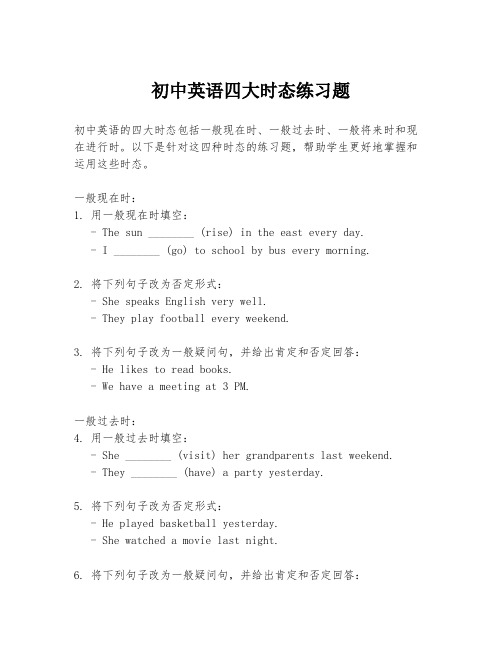
初中英语四大时态练习题初中英语的四大时态包括一般现在时、一般过去时、一般将来时和现在进行时。
以下是针对这四种时态的练习题,帮助学生更好地掌握和运用这些时态。
一般现在时:1. 用一般现在时填空:- The sun ________ (rise) in the east every day.- I ________ (go) to school by bus every morning.2. 将下列句子改为否定形式:- She speaks English very well.- They play football every weekend.3. 将下列句子改为一般疑问句,并给出肯定和否定回答:- He likes to read books.- We have a meeting at 3 PM.一般过去时:4. 用一般过去时填空:- She ________ (visit) her grandparents last weekend.- They ________ (have) a party yesterday.5. 将下列句子改为否定形式:- He played basketball yesterday.- She watched a movie last night.6. 将下列句子改为一般疑问句,并给出肯定和否定回答:- They went to the beach last summer.- I saw a movie last Friday.一般将来时:7. 用一般将来时填空:- I ________ (take) a trip next month.- We ________ (have) a test on Friday.8. 将下列句子改为否定形式:- He will go to the concert tomorrow.- She will finish her homework tonight.9. 将下列句子改为一般疑问句,并给出肯定和否定回答:- They will visit the museum next week.- I will start a new job next month.现在进行时:10. 用现在进行时填空:- Look! The children ________ (play) in the park. - Listen! She ________ (sing) in the next room.11. 将下列句子改为否定形式:- He is reading a book now.- They are watching TV.12. 将下列句子改为一般疑问句,并给出肯定和否定回答: - She is cooking dinner.- We are going to the cinema tonight.答案:1. rises, go2. She doesn't speak English very well. They don't playfootball every weekend.3. Does he like to read books? Yes, he does. / No, he doesn't. Do we have a meeting at 3 PM? Yes, we do. / No, we don't.4. visited, had5. He didn't play basketball yesterday. She didn't watch a movie last night.6. Did they go to the beach last summer? Yes, they did. / No, they didn't. Did I see a movie last Friday? Yes, I did. / No,I didn't.7. will take, will have8. He won't go to the concert tomorrow. She won't finish her homework tonight.9. Will they visit the museum next week? Yes, they will. / No, they won't. Will I start a new job next month? Yes, I will. / No, I won't.10. are playing, is singing11. He isn't reading a book now. They aren't watching TV.12. Is she cooking dinner? Yes, she is. / No, she isn't. Are we going to the cinema tonight? Yes, we are. / No, we aren't.。
四种时态及其练习(完整版)
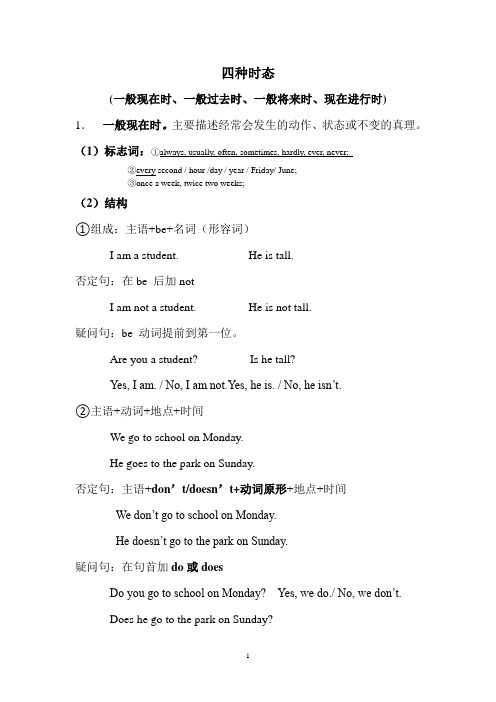
四种时态(一般现在时、一般过去时、一般将来时、现在进行时)1.一般现在时。
主要描述经常会发生的动作、状态或不变的真理。
(1)标志词:①always, usually, often, sometimes, hardly, ever, never;②every second / hour /day / year / Friday/ June;③once a week, twice two weeks;(2)结构①组成:主语+be+名词(形容词)I am a student. He is tall.否定句:在be 后加notI am not a student. He is not tall.疑问句:be 动词提前到第一位。
Are you a student? Is he tall?Yes, I am. / No, I am not.Yes, he is. / No, he isn’t.②主语+动词+地点+时间We go to school on Monday.He goes to the park on Sunday.否定句:主语+don’t/doesn’t+动词原形+地点+时间We don’t go to school on Monday.He doesn’t go to the park on Sunday.疑问句:在句首加do或doesDo you go to school on Monday? Yes, we do./ No, we don’t.Does he go to the park on Sunday?Yes, he does./ No, he doesn’t.(3)动词三单变化:①在原单词末尾加s , 如:like –likes②单词以o, sh, ch, s, x 结尾加es, 如:go –goes③单词末尾为辅音+y结尾去y加ies 如:study- studies2. 现在进行时:主要叙述正在发生的事情。
(完整版)四大时态综合练习(可编辑修改word版)
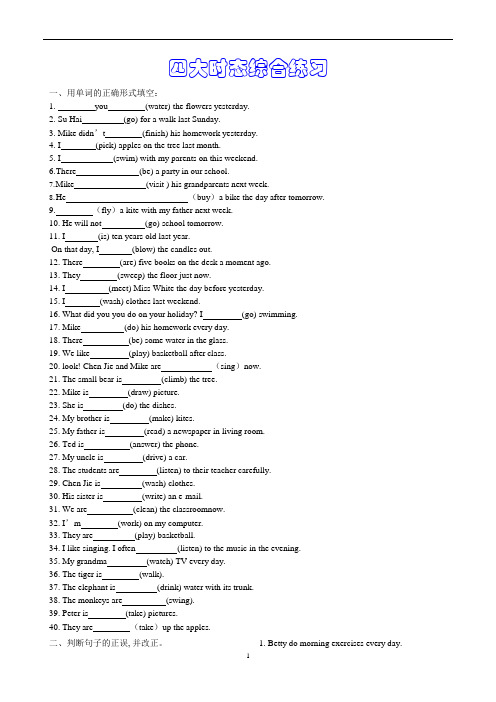
四大时态综合练习一、用单词的正确形式填空:1.you (water) the flowers yesterday.2.Su Hai (go) for a walk last Sunday.3.Mike didn’t (finish) his homework yesterday.4.I (pick) apples on the tree last month.5.I (swim) with my parents on this weekend.6.There (be) a party in our school.7.M ike (visit ) his grandparents next week.8.H e (buy)a bike the day after tomorrow.9. (fly)a kite with my father next week.10.He will not (go) school tomorrow.11.I (is) ten years old last year.On that day, I (blow) the candles out.12.There (are) five books on the desk a moment ago.13.They (sweep) the floor just now.14.I (meet) Miss White the day before yesterday.15.I (wash) clothes last weekend.16.What did you you do on your holiday? I (go) swimming.17.Mike (do) his homework every day.18.There (be) some water in the glass.19.We like (play) basketball after class.20.look! Chen Jie and Mike are (sing)now.21.The small bear is (climb) the tree.22.Mike is (draw) picture.23.She is (do) the dishes.24.My brother is (make) kites.25.My father is (read) a newspaper in living room.26.Ted is (answer) the phone.27.My uncle is (drive) a car.28.The students are (listen) to their teacher carefully.29.Chen Jie is (wash) clothes.30.His sister is (write) an e-mail.31.We are (clean) the classroomnow.32.I’m (work) on my computer.33.They are (play) basketball.34.I like singing. I often (listen) to the music in the evening.35.My grandma (watch) TV every day.36.The tiger is (walk).37.The elephant is (drink) water with its trunk.38.The monkeys are (swing).39.Peter is (take) pictures.40.They are (take)up the apples.二、判断句子的正误, 并改正。
(完整版)初一英语四大时态综合习题
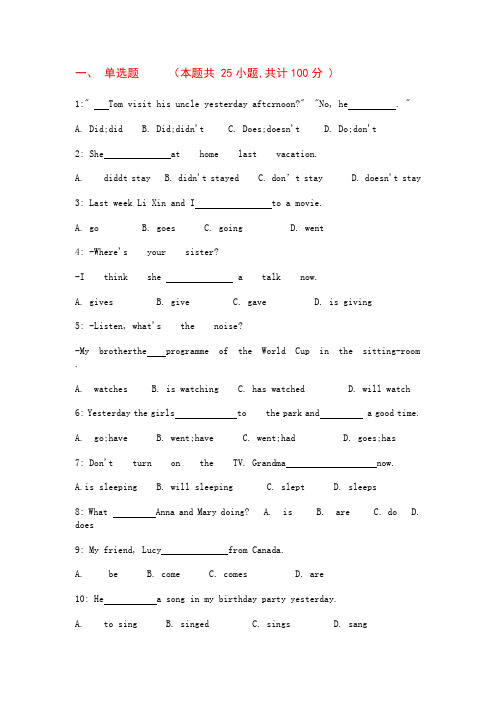
一、单选题(本题共 25小题,共计100分 )1:" Tom visit his uncle yesterday aftcrnoon?" "No, he . "A. Did;didB. Did;didn'tC. Does;doesn'tD. Do;don't2: She at home last vacation.A. diddt stayB. didn't stayedC. don’t stayD. doesn't stay3: Last week Li Xin and I to a movie.A. goB. goesC. goingD. went4: -Where's your sister?-I think she a talk now.A. givesB. giveC. gaveD. is giving5: -Listen, what's the noise?-My brotherthe programme of the World Cup in the sitting-room .A. watchesB. is watchingC. has watchedD. will watch6: Yesterday the girls to the park and a good time.A. go;haveB. went;haveC. went;hadD. goes;has7: Don't turn on the TV. Grandma now.A.is sleepingB. will sleepingC. sleptD. sleeps8: What Anna and Mary doing? A. is B. are C. do D. does9: My friend, Lucy from Canada.A. beB. comeC. comesD. are10: He a song in my birthday party yesterday.A. to singB. singedC. singsD. sang11: They in the dormitory at the moment.A. don't sleepingB. aren't sleepingC. isn't sleepingD. aren't sleep12: -When you the bike? -Last month.A. have;boughtB. had;boughtC. do;buyD.did;buy13: -ls she something? Is it fish?-Yes. Would you like ?A. eat,eatsB. eatting;to eatC. to eat;eatingD. eating;to eat14: Yesterday I didn't go out. I at homeA. stayB. am stayC. staiedD. stayed15: Molly stay yesterday.A. has to; at homeB. had to;in homeC. have to; homeD. had to; at home16: Everyone a lot fo fun now.A. haveB. havingC. is havingD.are having.17: Bob is not talking. He her.A. listen toB. is listening C、 is listening to D. listened to18: The earth round.A. isB. amC. areD. be19: - English every morning? -Yes, but now I Chinese.A.. Are you reading; readB. Do you read; readC. Do you read; am readingD. Are you reading; am reading20: Anito her homework carefully over the weekend.A do B. does C. doing D. did21:This week I interviewed (采访) students fashion. Some of their answers me.A. about;surpriseB. about; surprisedC. on;surprise D.of;surprises22: -Where is the cake I made this morning?-We it, Mom. Can you make another one for us?A. ateB. eatC. will eatD. were eating23: He to the movies yesterday. He stayed at home.A. goB. didn't wentC. didn't goD. wasn't go24: There was a strange sound outside. Mary went outand around,but she nothing.A. looked; sawB. saw,sawC. watched;lookedD.looked;find25: are you ?A. Who;waiting forB. What;waitingC. Who;wait for D . What;wait答案:1. B2. A3. D4. D5. B6.C 7. A 8. B 9. C 10. D11. B 12. D 13. D 14. D 15. D 16. C 17. C 18.A 19.C 20. D21. B 22. A 23. C 24. A 25. A。
初中英语四个基本时态
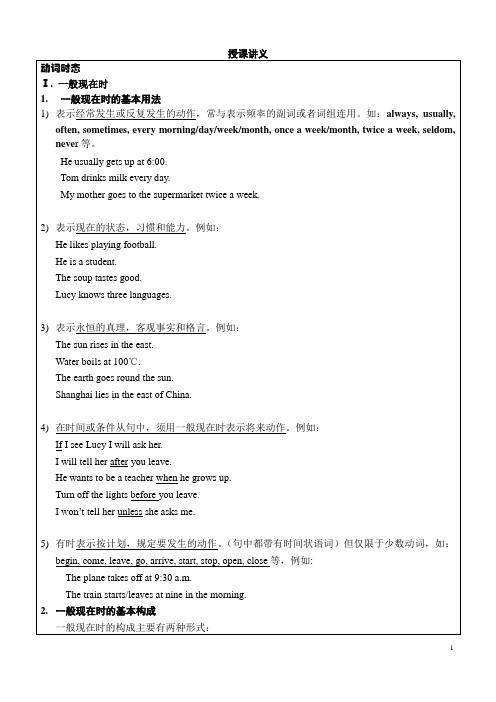
我以为你病了呢。(这句话应是在说话之前,我以为你病了。但是现在我知道你没病)
2.一般过去时的构成
a.动词过去式的变化可速记为“直”、“去”、“双”、“改”四字诀。
一般情况下在动词原形后直接加-ed
work—worked learn—learned want—wanted
I won’t tell herunlessshe asks me.
5)有时表示按计划,规定要发生的动作。(句中都带有时间状语词)但仅限于少数动词,如:begin, come, leave, go, arrive, start, stop, open, close等,例如:
The plane takes off at 9:30 a.m.
Will you be at home at seven this evening?
2)be going to +不定式,表示将来。
a.主语的意图,即将做某事。
What are you going to do tomorrow?
b.计划,安排要发生的事。
The play is going to be produced next month。
—Are they students? —Yes, they are. /No, they aren’t.
2)实义动词型:句中的谓பைடு நூலகம்动词为实义动词:
a.肯定句中,主语(第一、二人称和复数)+动词原形+宾语
I usually get up at 7 every morning.
b.肯定句中,主语(第三人称单数she, he, it)+动词词尾要加-S +宾语
四个时态练习题初二
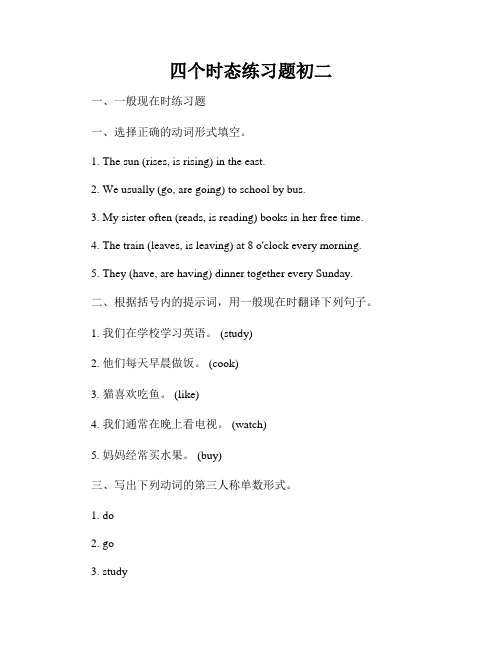
四个时态练习题初二一、一般现在时练习题一、选择正确的动词形式填空。
1. The sun (rises, is rising) in the east.2. We usually (go, are going) to school by bus.3. My sister often (reads, is reading) books in her free time.4. The train (leaves, is leaving) at 8 o'clock every morning.5. They (have, are having) dinner together every Sunday.二、根据括号内的提示词,用一般现在时翻译下列句子。
1. 我们在学校学习英语。
(study)2. 他们每天早晨做饭。
(cook)3. 猫喜欢吃鱼。
(like)4. 我们通常在晚上看电视。
(watch)5. 妈妈经常买水果。
(buy)三、写出下列动词的第三人称单数形式。
1. do2. go3. study5. watch二、一般过去时练习题一、选择正确的动词形式填空。
1. Last night, I (watched, am watching) a movie with my friends.2. We (visited, are visiting) the museum last Sunday.3. He (studied, is studying) English two years ago.4. Sarah (played, is playing) soccer after school yesterday.5. They (ate, are eating) dinner at a restaurant last night.二、根据括号内的提示词,用一般过去时翻译下列句子。
1. 我昨天在公园里踢足球。
(完整版)初中英语各种时态练习题集锦
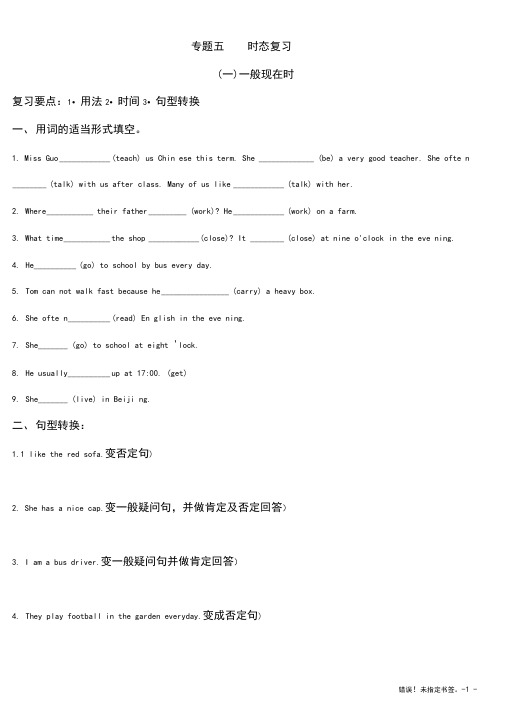
专题五时态复习(一)一般现在时复习要点:1•用法2•时间3•句型转换一、用词的适当形式填空。
1.Miss Guo ____________ (teach) us Chin ese this term. She _____________ (be) a very good teacher. She ofte n ________ (talk) with us after class. Many of us like ____________ (talk) with her.2.Where ___________ their father _________ (work)? He ____________ (work) on a farm.3.What time ___________ the shop ____________ (close)? It ________ (close) at nine o'clock in the eve ning.4.He__________ (go) to school by bus every day.5.Tom can not walk fast because he ________________ (carry) a heavy box.6.She ofte n __________ (read) En glish in the eve ning.7.She_______ (go) to school at eight 'lock.8.He usually __________ up at 17:00. (get)9.She_______ (live) in Beiji ng.二、句型转换:1.1 like the red sofa.变否定句)2. She has a nice cap.变一般疑问句,并做肯定及否定回答)3. I am a bus driver.变一般疑问句并做肯定回答)4.They play football in the garden everyday.变成否定句)5.There is an egg in the basket变成复数形式的句子)(二)一般过去时复习要点:1•用法2•时间3•句型转换一、将下列动词变成过去式。
初中英语时态综合练习(附带答案)

英语综合时态练习一.各种时态下的动词形式1.一般现在时:2.一般过去时:3.一般将来时:4.现在进行时:5.过去进行时:6.现在完成时:7.过去完成时:8.过去将来时:二.单选1 .My sister _____ the Youth League last year. She _____ a Youth League member for about a year now.A.joined…has becomeB. joined…has beenC. has joined…has beenD. did join…had been2. I’ll talk to him when he ______.A. comeB. will comeC. comesD. came3. They _____ supper when we _____ into the room.A. are having…wentB. were having…goC. were having…wentD. are having…go4. We’ll go climbing if it _____ tomorrow.A. won’t rainB. did rainC. isn’t rainD. doesn’t rain5. I don’t know if it _____ tomorrow.A. will rainB. rainsC. rainedD. is rain6. Most people ____ TV.A. enjoy to watchB. enjoy watchC. enjoy watchingD. enjoys watching7. Father ____ his cap and went out.A. put onB. puts onC. had putD. will put on8. How long _____ your uncle ____ in the army ?A. has…joinedB. has…beenC. does…joinD. had…joined9. Peter _____ the work in a week.A. have finishedB. finishesC. is finishingD. will finish10. The students _____ the History Museum if it _____ fine tomorrow.A. will visit….isB. will visit…will beC. would visit …wasD. would visit…would be11. Joan ____ me whether I _____ the book before.A. asked…had readB. asked…shall readC. asked…would readD. asked…has read12._____ she _____ her lessons at seven yesterday evening ?A. Was…going overB. Is…go overC. Has…gone overD. Will…go over13. He can’t go to the cinema with me because he ____ a meeting at the moment.A. was havingB. would haveC. is havingD. had14. Both of the two dictionaries ____ very useful.A. areB. isC. wasD. am15. He _____ to me since last month.A. didn’t writeB. hadn’t writtenC. hasn’t writtenD. won’t write16. Xu Ping ____ to Japan only once.A. has goneB. had goneC. had beenD. has been17. Nobody ____ the answer.A. have knownB. knewC. didn’t knowD. are knowing18.______ you ever ____ to Nanjing ?A. Have…goneB. Have…beenC. Do…goD. Will …go19. He ____ he ____ something wrong before.A. says…wasB. say….have doneC. said…had doneD. said…would do20. He ____ me he ____ an interesting book.A. tell…would borrowB. told …will borrowC. tell…will borrowD. told …had borrowed21. Thomas Edison ____ already ____ a chemistry lab for himself by the time he ____ ten.A. has…built…wasB. had…built…wasC. would…build…wasD. was…building…is22. At the age of eleven, my grandfather _____ to work in a factory.A. beganB. has begunC. will beginD. begins23. One day while I ____ along the street, I ____ someone calling.A. walked…was hearingB. was walking…had heardC. was walking…heard24. Neither I nor he _____.A. can swims wellB. are swimming wellC. swims wellD. have swum well25. ____ you ____ where your sister has gone ?A. Did …knowB. Will…knowC. Are…knowD. Do …know26. Betty ____ morning exercises yesterday.A. not didB. don't doC. didn’t doD. won’t do27. The door of her room _____ every day.A. cleansB. are cleanedC. cleanedD. is cleaned28. No rubbish ____ for three weeks.A. collectedB. is collectedC. has collectedD. has been collected29. Another railway bridge ____ there now.A. is buildingB. is being builtC. is builtD. has been built30. ____ this film ____ last week ?A. Did…showB. Has…been shownC. Was…shownD. Was…be shown31. He told me that the composition ____ by him.A. was not writtenB. not was writtenC. is not writtenD. not is written32._____ the play ____ again next week?A. Will…put onB. Is…put onC. Will be…put onD. Will…be put on33. She ____ to a hospital at once.A. must sendB. must be sentC. must to be sentD. had to send34. Mike usually ____ up at six in the morning.A. getB. getsC. gotD. will get35. The sun _____ us light and heat.A. giveB. givesC. will giveD. often give36.Tom looked sad and cried , “ I ____ terrible right now!”A. am feelingB. feelsC. will feelD. have felt37.At that time , things _____ hard for the working people.A. isB. areC. wasD. were38. Long long ago, there ____ a farmer in a small village.A. areB. wereC. isD. was39. He is going to be a doctor when he _____.A. grow upB. grows upC. will grow upD. is going to grow up40. I’ll tell him all about it as soon as he ____.A. come backB. comes backC. will come backD. is going come back41. My little sister ____ six next month.A. will beB. shall beC. can beD. is going to42. Work hard, and you ____ catch up with the others.A. can beB. willC. shallD. are going to43. Where is Jenny ? She ____ in the next room.A. do some readingB. does some readingC. is doing some readingD. will do some reading44. Look! Tom ____ in the river.A. go swimmingB. goes swimmingC. going to swimmingD. is swimming45. His sister __ ___ cakes. That’s why her hands are all covered with flour (面粉).A. makesB. madeC. will makeD. is making46. Listen carefully ! Can you hear what the professor ____ ?A. talks aboutB. talked aboutC. is talking aboutD. will talk about47. What ____ you ____at this time yesterday ?A. do…doB. are…doingC. were…doingD. would…do48. When I got there, the Browns ____ at the lunch table.A. is sitingB. are sittingC. was sitingD. were sitting49. It suddenly began to rain while I ______ the bus.A. waitB. waitedC. was waiting forD. were waiting for50. The train will arrive _____.A. after an hourB. in an hourC. an hour laterD. for an hour51. How many English films ____ since last year ?A. do you seeB. did you seeC. have you seenD. had you seen52. Mr Smith works in Beijing. He ____ since 1978.A. has come thereB. has came thereC. has been thereD. has gone there53. Her grandma ____ for five years.A. diesB. has diedC. was deadD. has been dead54. Have you ____ heard the story about Edison ?A. everB. neverC. evenD. once55. The day after tomorrow ____ my birthday.A. will beB. should beC. may beD. is going to be56. The workers said that they would all leave if John _____.A. stayB. stayedC. staysD. was going to stay57.I’ve worked in the factory ____.A. since three yearsB. before three yearsC. since three years agoD. for three years ago58. We ____ about you just now.A. are talkingB. were talkingC. talkD. have talked59. I have just had my lunch. I _____ it at home.A. have hadB. had hadC. hadD. have60. He asked me whether I ____ the play before.A. have seenB. had seenC. sawD. was seeing61. He went to bed after he ____ his work.A. didB. doesC. has doneD. have done62. Your mother _____ you at the gate.A. waits forB. wait forC. is waiting forD. waiting for63. The train ____ here for ten minutes .A. has stoppedB. has comeC. has gotD. has been64. I’m looking for my watch. I ____ it a moment ago.A. loseB. lostC. have lostD. was lost65. When he sees me, he always ____ to me.A. smileB. is smilingC. smiledD. smiles66. By this time tomorrow, I ____ the book.A. will finish to readB. will have finished readingC. will finish readingD. will have finished to read67. Is this the first time you _____ Beijing ?A. visitB. visitedC. have visitedD. have been visiting68. I _____ to school, only to find out that it was a holiday.A. hurryB. had hurriedC. have hurriedD. hurried69. I ____ along the street when I caught sight of an old friend of mine.A. wentB. had goneC. was goingD. would go70. Can you imagine how the game _____?A. wonB. had wonC. was wonD. wins71. John was tired out. He ____ all day.A. was workingB. had been workedC. workedD. had been working72. "I’m afraid you can’t sit here." "Sorry, I ______ know."A. don’tB. can’tC. won’tD. didn’t73. He told me that he ______ to see us the next day.A. comesB. cameC. will comeD. would come74. The teacher told us that the sun ______ bigger than the earth.A. isB. wasC. has beenD. will be答案:1-5 BCCDA6-10 CABDA11-15 AACAC16-20 DBBCD21-25 AACCD26-30 CCDBC31-35 ADBBB36-40 ADDBB41-45 ABCDD46-50 CCDCB51-55 CCDAA56-60 BCBCB61-65 ACDBD66-70 BCDCC71-74 DDDA。
初中必备英语动词的时态技巧全解及练习题(含答案)含解析
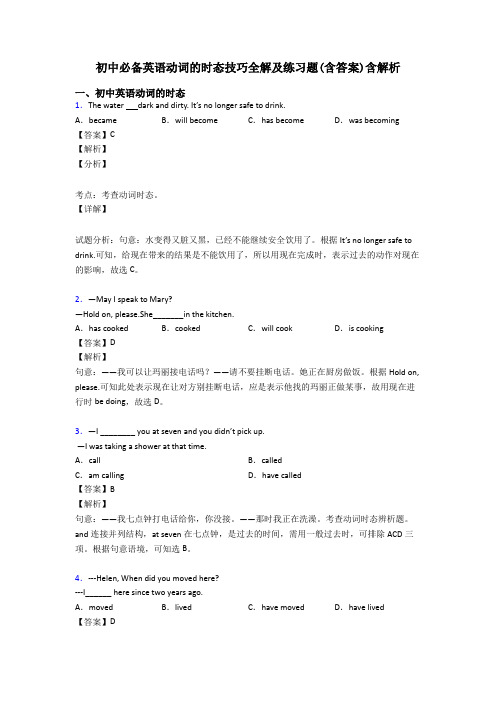
初中必备英语动词的时态技巧全解及练习题(含答案)含解析一、初中英语动词的时态1.The water dark and dirty. It’s no longer safe to drink.A.became B.will become C.has become D.was becoming【答案】C【解析】【分析】考点:考查动词时态。
【详解】试题分析:句意:水变得又脏又黑,已经不能继续安全饮用了。
根据It’s no longer safe to drink.可知,给现在带来的结果是不能饮用了,所以用现在完成时,表示过去的动作对现在的影响,故选C。
2.—May I speak to Mary?—Hold on, please.She_______in the kitchen.A.has cooked B.cooked C.will cook D.is cooking【答案】D【解析】句意:——我可以让玛丽接电话吗?——请不要挂断电话。
她正在厨房做饭。
根据Hold on, please.可知此处表示现在让对方别挂断电话,应是表示他找的玛丽正做某事,故用现在进行时be doing,故选D。
3.—I ________ you at seven and you didn’t pick up.—I was taking a shower at that time.A.call B.calledC.am calling D.have called【答案】B【解析】句意:——我七点钟打电话给你,你没接。
——那时我正在洗澡。
考查动词时态辨析题。
and连接并列结构,at seven在七点钟,是过去的时间,需用一般过去时,可排除ACD三项。
根据句意语境,可知选B。
4.---Helen, When did you moved here?---I______ here since two years ago.A.moved B.lived C.have moved D.have lived【答案】D试题分析:句意:―海伦,你什么时候搬到这儿的?―从两年前我就住在这儿。
初中英语四种时态练习题
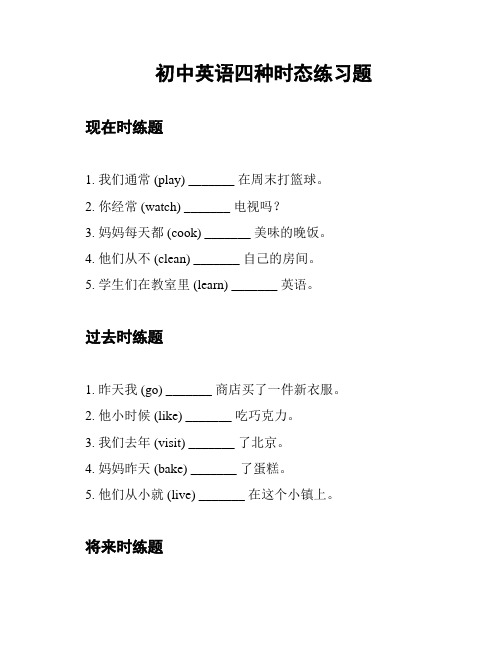
初中英语四种时态练习题现在时练题
1. 我们通常 (play) _______ 在周末打篮球。
2. 你经常 (watch) _______ 电视吗?
3. 妈妈每天都 (cook) _______ 美味的晚饭。
4. 他们从不 (clean) _______ 自己的房间。
5. 学生们在教室里 (learn) _______ 英语。
过去时练题
1. 昨天我 (go) _______ 商店买了一件新衣服。
2. 他小时候 (like) _______ 吃巧克力。
3. 我们去年 (visit) _______ 了北京。
4. 妈妈昨天 (bake) _______ 了蛋糕。
5. 他们从小就 (live) _______ 在这个小镇上。
将来时练题
1. 我明天 (meet) _______ 你在学校门口。
2. 那个公司下个月 (launch) _______ 一款新产品。
3. 我们下周末 (go) _______ 爬山。
4. 你下个星期六 (have) _______ 什么计划?
5. 她明年 (travel) _______ 到欧洲。
现在进行时练题
1. 他们现在 (study) _______ 数学。
2. 你为什么 (wear) _______ 这件新衣服?
3. 妈妈正在 (cook) _______ 晚饭。
4. 我们下周末 (go) _______ 看电影。
5. 学生们正在 (learn) _______ 新的课程。
以上是初中英语四种时态的练习题。
请根据句子的要求填写正确的动词形式。
九年级英语时态复习练习题及答案
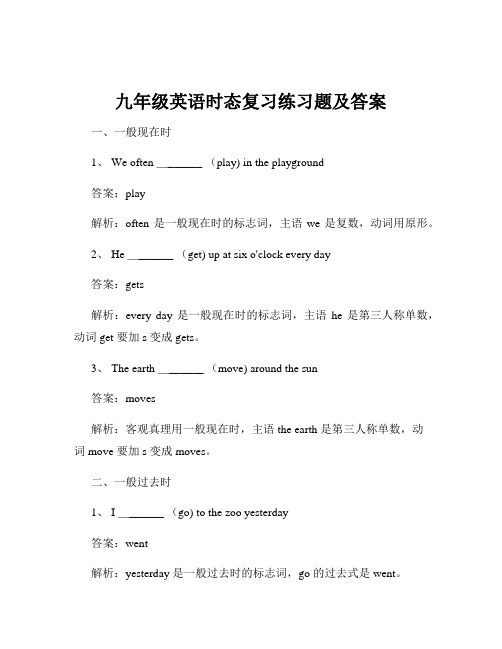
九年级英语时态复习练习题及答案一、一般现在时1、 We often _______ (play) in the playground答案:play解析:often 是一般现在时的标志词,主语 we 是复数,动词用原形。
2、 He _______ (get) up at six o'clock every day答案:gets解析:every day 是一般现在时的标志词,主语he 是第三人称单数,动词 get 要加 s 变成 gets。
3、 The earth _______ (move) around the sun答案:moves解析:客观真理用一般现在时,主语 the earth 是第三人称单数,动词 move 要加 s 变成 moves。
二、一般过去时1、 I _______ (go) to the zoo yesterday答案:went解析:yesterday 是一般过去时的标志词,go 的过去式是 went。
2、 She _______ (be) happy last week答案:was解析:last week 是一般过去时的标志词,主语 she 是第三人称单数,be 动词用 was。
3、 They _______ (not do) their homework last night答案:didn't do解析:last night 是一般过去时的标志词,否定句要用助动词didn't,后面接动词原形 do。
三、一般将来时1、 We _______ (have) a party next week答案:will have / are going to have解析:next week 是一般将来时的标志词,可以用 will +动词原形或者 be going to +动词原形的结构。
2、 He _______ (come) back tomorrow答案:will come / is going to come解析:tomorrow 是一般将来时的标志词,同理可用 will +动词原形或者 be going to +动词原形。
中考英语专项5.时态讲解及习题
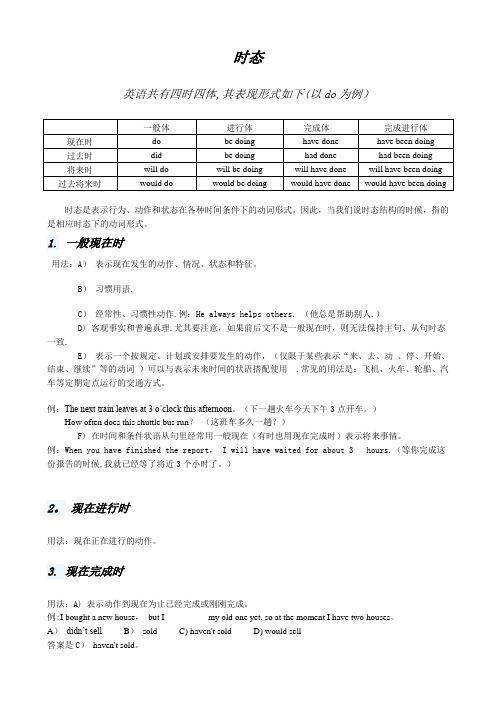
时态英语共有四时四体,其表现形式如下(以do为例)时态是表示行为、动作和状态在各种时间条件下的动词形式。
因此,当我们说时态结构的时候,指的是相应时态下的动词形式。
1. 一般现在时用法:A)表示现在发生的动作、情况、状态和特征。
B)习惯用语.C)经常性、习惯性动作.例:He always helps others. (他总是帮助别人.)D) 客观事实和普遍真理.尤其要注意,如果前后文不是一般现在时,则无法保持主句、从句时态一致.E)表示一个按规定、计划或安排要发生的动作,(仅限于某些表示“来、去、动、停、开始、结束、继续”等的动词)可以与表示未来时间的状语搭配使用.常见的用法是:飞机、火车、轮船、汽车等定期定点运行的交通方式。
例:The next train leaves at 3 o’clock this afternoon。
(下一趟火车今天下午3点开车。
)How often does this shuttle bus run?(这班车多久一趟?)F) 在时间和条件状语从句里经常用一般现在(有时也用现在完成时)表示将来事情。
例:When you have finished the report, I will have waited for about 3 hours.(等你完成这份报告的时候,我就已经等了将近3个小时了。
)2。
现在进行时用法:现在正在进行的动作。
3. 现在完成时用法:A) 表示动作到现在为止已经完成或刚刚完成。
例:I bought a new house,but I _________ my old one yet, so at the moment I have two houses。
A)didn’t sell B)sold C) haven't sold D) would sell答案是C)haven't sold。
B) 表示从过去某时刻开始,持续到现在的动作或情况,并且有可能会继续延续下去。
(完整版)初一英语各种时态复习及练习题
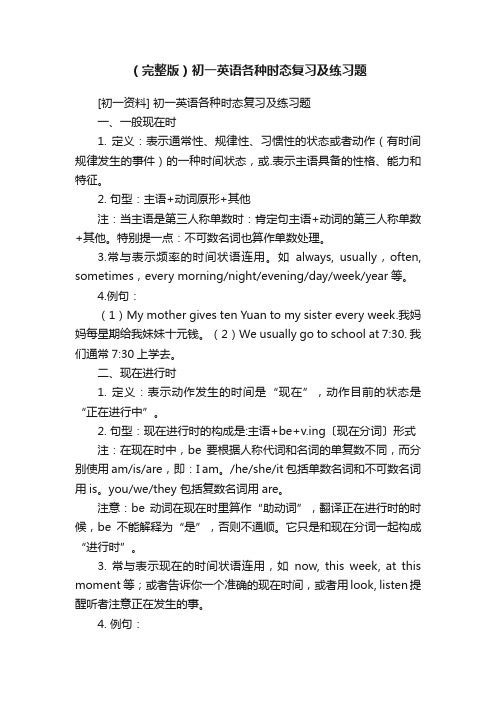
(完整版)初一英语各种时态复习及练习题[初一资料] 初一英语各种时态复习及练习题一、一般现在时1. 定义:表示通常性、规律性、习惯性的状态或者动作(有时间规律发生的事件)的一种时间状态,或.表示主语具备的性格、能力和特征。
2. 句型:主语+动词原形+其他注:当主语是第三人称单数时:肯定句主语+动词的第三人称单数+其他。
特别提一点:不可数名词也算作单数处理。
3.常与表示频率的时间状语连用。
如always, usually,often, sometimes,every morning/night/evening/day/week/year等。
4.例句:(1)My mother gives ten Yuan to my sister every week.我妈妈每星期给我妹妹十元钱。
(2)We usually go to school at 7:30. 我们通常7:30上学去。
二、现在进行时1. 定义:表示动作发生的时间是“现在”,动作目前的状态是“正在进行中”。
2. 句型:现在进行时的构成是:主语+be+v.ing〔现在分词〕形式注:在现在时中,be 要根据人称代词和名词的单复数不同,而分别使用am/is/are,即:I am。
/he/she/it 包括单数名词和不可数名词用is。
you/we/they 包括复数名词用are。
注意:be 动词在现在时里算作“助动词”,翻译正在进行时的时候,be不能解释为“是”,否则不通顺。
它只是和现在分词一起构成“进行时”。
3. 常与表示现在的时间状语连用,如now, this week, at this moment 等;或者告诉你一个准确的现在时间,或者用look, listen提醒听者注意正在发生的事。
4. 例句:(1)They are playing basketball now.现在他们正在打篮球。
(2)Listen! She is singing a song.听,她正在唱歌。
初中时态专练(附经典配套习题及答案)
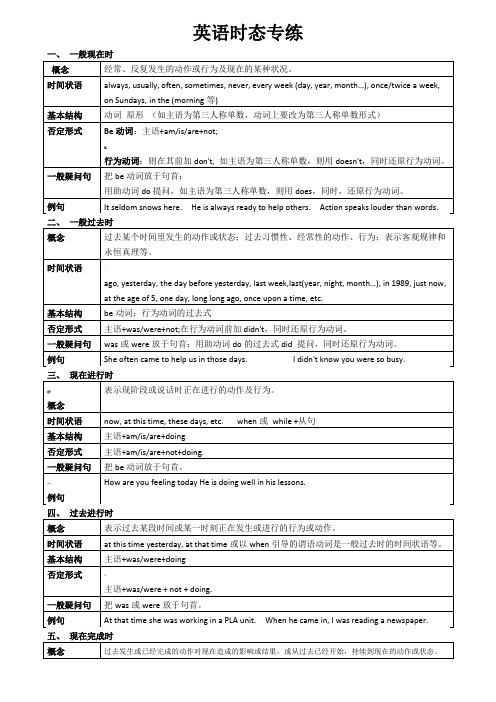
英语动作有四种,经常做、正在做、将要做和过去做。
经常做用动原或三单, 要借do 或 does 变问、否过去做动词改成过去式, 要借did 变问、否;正在做用be加动词ing,两个部分缺一不可;将要做主要有两种 will加动原或be going to加动原。
专项练习I、用所给词的适当形式填空:1.He__________swimming in the river every day in summer. (go)2. What__________you__________ at five yesterday afternoon (do)<3. Look, the children__________ basketball on the playground. (play)4. He______________to the radio when I came in, (listen)5. The bike is nice . How much__________it__________ (cost)6. I need some paper. I______________ some for you . (bring)7. When__________you__________the car In 1998 . ( buy )8. He said that he ______________back in five minutes . (come)9. I didn’t meet him. He______________ when I got there. (leave)10. I______________my bike, so I have to walk to school. (lose)11. He______________down and began to read his newspaper. ( sit )12. He is very hungry. He_____________________ anything for three days. ( not eat ) !13. I______________with you if I have time. (go )14. We__________good friends since we met at school . (be)15. I will tell her the news when she______________to see me next week. (come) II、选择最佳答案填空()go swimming if the weather__________fine tomorrow.A. is C. will be going to be()years since he has left for Beijing.A. wasB. has been going to be()dont leave the office until your friend______________back.come come—()the end of last year he______________about 1500 English words.A. learns learning learned()! Someone______________in the next room .crying cried()must tell him the news as soon as you______________him.see seeing()told me that he______________to see us the next day.B. cameC. will comeD. would come()cant find him anywhere . Perhaps he______________home.A. is goingB. wentC. has comeD. would come(()teacher told us that the sun______________bigger than the earth.A. isB. wasC. has been be()you tell me where the railway station______________A. wasB. isC. will beD. would be()the Great Wall several times.A. goB. were goingC. have gone been()seemed that the old man__________for something over there.A. looksB. lookedC. was lookingD. has looked()was sure that he__________his wallet in the office .A. leftB. would leaveC. had leftD. has left)()must study hard if you__________ want to fail the exam.A. wontB. dontC. haventD. hadnt()15. Im afraid you cant sit here . Sorry , I__________know.A. don’tB. wontC. cantD. didnt()16. As she__________the newspaper , Granny__________asleep.A. read , was fallingB. was reading fellC. was reading , was falling , fell()17. Jim is not coming tonight . But he__________ !A. promises(许诺)B. promisedC. will promiseD. had promised ()18. What’s her name I__________.A. forgetB. forgotC. had forgottenD. am forgetting:III、动词时态能力综合测试()often__________his clothes on Sundays.A. washingB. washesC. has washedD. wash()Chinese. Where__________fromA. do you comeB. you are comingC. you comeD. are you coming()school.A. never walksB. is never walkingC. walk neverD. never is walking ()will start as soon as our teacher__________ .A. comesB. will comeC. comeD. is coming()long ago__________playing football《A. have you stoppedB. had you stoppedC. did you stopD. do you stop ()hard when I left my house .A. is rainingB. rainsC. was rainingD. will rain()think this question__________to answer.A. easyB. is easyC. was easyD. will easy()8. Dont talk so loudly . Your father__________.A. sleepsB. is sleepingC. sleptD. had slept()many people does the doctor know who__________of the disease (疾病)A. are dyingB. is dyingC. has diedD. dies ()homework now.|A. finishB. finishedC. have finishedD. had finished()three years.A. has joinedB. has been in the armyC. joinedD. has served the army ()grandfather__________for thirty years.A. diedB. was deadC. has been deadD. has died()from my brother for a long time.A. not have heardB. have not heardC. have heard notD. do not hear (), one of the most important subjects, __________always interested him.A. hasB. haveC. areD. is()your brother go to America last year __________.—A. No , he did never go thereB. No , he has never gone hereC. No , he never was thereD. No , he has never been there()that factory since 1958.A. has leftB. has worked inC. has gone fromD. has come to ()teacher__________to Beijing three times.A. wentB. had goneC. has goneD. has been()week John__________his leg.A. felt and brokenB. fell and brokeC. feels and breaksD. fallen and broken ()thick coat because it was snowing.A. puts onB. put onC. takes onD. took on!()picture on the wall.A. hangedB. hungC. has hangedD. was hanged()month__________twenty five.A. has my sisterB. my sister will beC. my sister shall haveD. my sister is going to be()again in a few weeks.A. will seeB. have seenC. had seenD. have been seen()23. By the end of last term we__________English for two years.A. have studiedB. have been studiedC. would studiedD. had studied()Brown__________in New York for three years before she went to London.}A. livedB. had livedC. has livedD. will live()we arrived , the dinner__________.A. already beganB. has already begunC. had already begunD. was just begun()will go home for the holiday as soon as I__________ my exams.A. will finishB. finishC. finishingD. finished(), I‘ll talk to him.A. does Peter comeB. Peter will comeC. Peter comesD. can Peter come()sister__________to see me . Shell be here soon.A. comesB. is comingC. had comeD. came()said they__________our answer the next day .A. had heardB. would hear ofC. would hearD. will hear()old man said that light__________faster than sound.A. wentB. will goC. travelsD. will travel动词时态专项训练(答案)一、1.goes 2. seems 3. are playing 4. was listening rain 6. will bring7. took 8. would come 9. has left 11. sat 12. hasn't eaten 13. will go 14. is 15. comes 16. did buy 17. have been 18. were doing 19. does cost二、1. A 2. B 3. B 4. D 5. C 6. A 7. D 8. C 9. A 10. B 11. D 12. C 13.C 14. B 15. A三、1. B 2. A 3. A 4. A 5. C 6. C 7. B 8. B 9. A 10. C 11. B 12. C 13. B 14. D15. D 16. B 17. D 19. B 20. B 21. B 23. D 24. B 25. C 26. B 27. C 28. B 29. C 30.。
初中英语时态知识梳理及练习题含答案
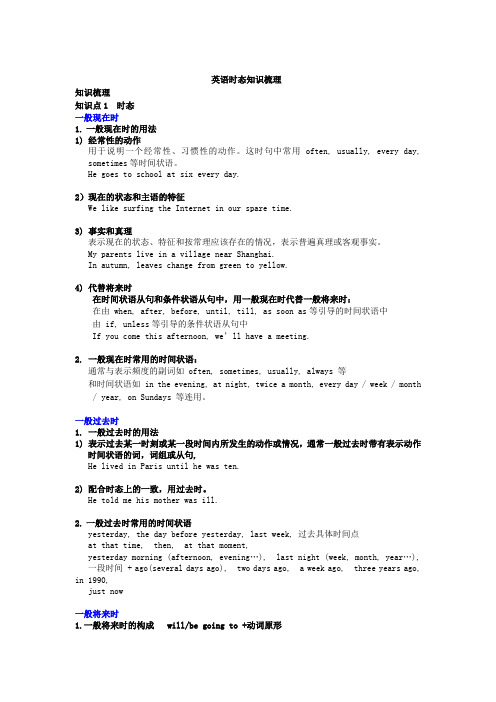
英语时态知识梳理知识梳理知识点1 时态一般现在时1.一般现在时的用法1) 经常性的动作用于说明一个经常性、习惯性的动作。
这时句中常用often, usually, every day, sometimes等时间状语。
He goes to school at six every day.2)现在的状态和主语的特征We like surfing the Internet in our spare time.3) 事实和真理表示现在的状态、特征和按常理应该存在的情况,表示普遍真理或客观事实。
My parents live in a village near Shanghai.In autumn, leaves change from green to yellow.4) 代替将来时在时间状语从句和条件状语从句中,用一般现在时代替一般将来时:在由 when, after, before, until, till, as soon as等引导的时间状语中由 if, unless等引导的条件状语从句中If you come this afternoon, we’ll have a meeting.2. 一般现在时常用的时间状语:通常与表示频度的副词如 often, sometimes, usually, always 等和时间状语如 in the evening, at night, twice a month, every day / week / month / year, on Sundays 等连用。
一般过去时1. 一般过去时的用法1) 表示过去某一时刻或某一段时间内所发生的动作或情况,通常一般过去时带有表示动作时间状语的词,词组或从句,He lived in Paris until he was ten.2) 配合时态上的一致,用过去时。
He told me his mother was ill.2.一般过去时常用的时间状语yesterday, the day before yesterday, last week, 过去具体时间点at that time, then, at that moment,yesterday morning (afternoon, evening…), last night (week, month, year…), 一段时间 + ago(several days ago), two days ago, a week ago, three years ago, in 1990,just now一般将来时1.一般将来时的构成 will/be going to +动词原形2. 一般将来时的用法1) will/won’t表示预测的将来,即认为某事肯定会发生;还可表示将来的意愿;将来的事实。
完整版)四大英语时态练习题
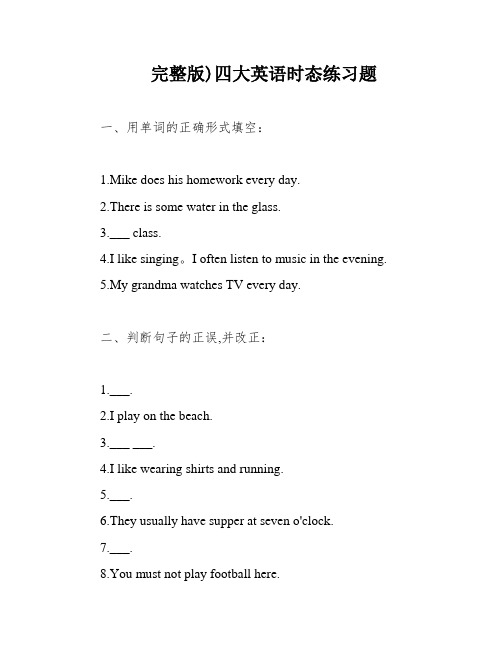
完整版)四大英语时态练习题一、用单词的正确形式填空:1.Mike does his homework every day.2.There is some water in the glass.3.___ class.4.I like singing。
I often listen to music in the evening.5.My grandma watches TV every day.二、判断句子的正误,并改正:1.___.2.I play on the beach.3.___ ___.4.I like wearing shirts and running.5.___.6.They usually have supper at seven o'clock.7.___.8.You must not play football here.9.___.10.Sometimes I watch TV on Sunday.三、选择最佳的答案:1.Does Alice often play the piano。
No。
she doesn't.2.Does your ___ live in Beijing?3.Tom and Mike are very excited。
they will take a trip.4.I like dancing very much。
What about you?1.collect - collecting2.like - liking3.doesn't - does not4.do - does5.did - does6.watch - watching7.play - playing8.cook - cooking9.water - watering10.wash - washing二、改写句子:1.Does Mingming usually water the flowers every day。
英语四大时态练习题
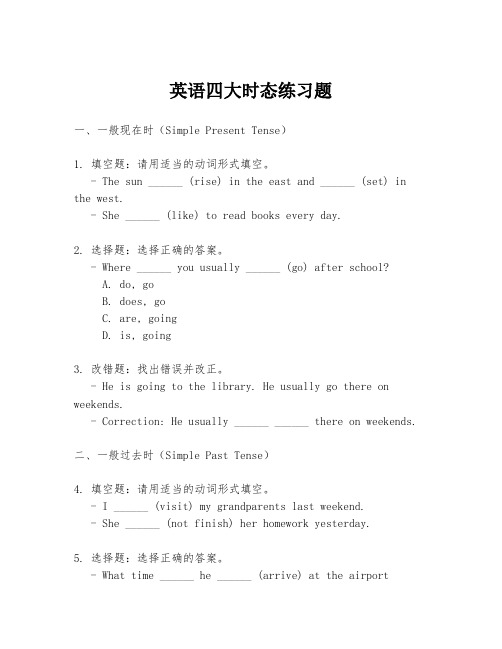
英语四大时态练习题一、一般现在时(Simple Present Tense)1. 填空题:请用适当的动词形式填空。
- The sun ______ (rise) in the east and ______ (set) in the west.- She ______ (like) to read books every day.2. 选择题:选择正确的答案。
- Where ______ you usually ______ (go) after school?A. do, goB. does, goC. are, goingD. is, going3. 改错题:找出错误并改正。
- He is going to the library. He usually go there on weekends.- Correction: He usually ______ ______ there on weekends.二、一般过去时(Simple Past Tense)4. 填空题:请用适当的动词形式填空。
- I ______ (visit) my grandparents last weekend.- She ______ (not finish) her homework yesterday.5. 选择题:选择正确的答案。
- What time ______ he ______ (arrive) at the airportyesterday?A. did, arrivedB. does, arriveC. did, arrive inD. do, arrives6. 改错题:找出错误并改正。
- She was very tired, so she went to bed early. She also went to bed early yesterday.- Correction: She also ______ ______ to bed early yesterday.三、一般将来时(Simple Future Tense)7. 填空题:请用适当的动词形式填空。
初中英语四种时态练习题
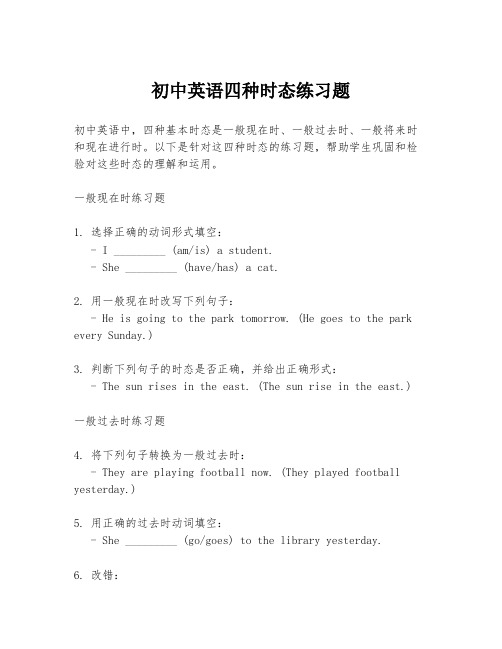
初中英语四种时态练习题初中英语中,四种基本时态是一般现在时、一般过去时、一般将来时和现在进行时。
以下是针对这四种时态的练习题,帮助学生巩固和检验对这些时态的理解和运用。
一般现在时练习题1. 选择正确的动词形式填空:- I _________ (am/is) a student.- She _________ (have/has) a cat.2. 用一般现在时改写下列句子:- He is going to the park tomorrow. (He goes to the park every Sunday.)3. 判断下列句子的时态是否正确,并给出正确形式:- The sun rises in the east. (The sun rise in the east.)一般过去时练习题4. 将下列句子转换为一般过去时:- They are playing football now. (They played football yesterday.)5. 用正确的过去时动词填空:- She _________ (go/goes) to the library yesterday.6. 改错:- I was walked to school yesterday. (I walked to school yesterday.)一般将来时练习题7. 用一般将来时填空:- I _________ (visit) my grandparents next weekend.8. 将下列句子转换为一般将来时:- They are having a party tonight. (They will have a party tonight.)9. 判断下列句子的时态是否正确,并给出正确形式:- She will goes to the concert. (She will go to the concert.)现在进行时练习题10. 将下列句子转换为现在进行时:- He is reading a book. (He reads a book every evening.)11. 用正确的现在进行时动词填空:- They _________ (eat/are eating) dinner right now.12. 改错:- She is sing in the choir. (She is singing in the choir.)附加练习题13. 将下列句子转换为正确的时态:- The children are playing in the park. (It was rainingyesterday, so the children didn't play in the park.)14. 用正确的时态填空:- If it _________ (not rain) tomorrow, we _________ (go) to the beach.15. 判断下列句子的时态是否正确,并给出正确形式:- They will be playing football when we arrive. (They will be playing football when we arrive.)这些练习题覆盖了初中英语中四种基本时态的用法,通过练习,学生可以更好地掌握和运用这些时态。
初中英语4大时态与练习
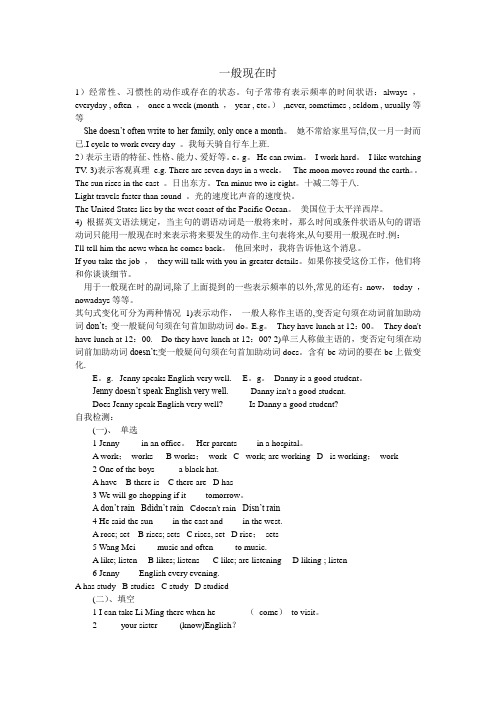
一般现在时1)经常性、习惯性的动作或存在的状态。
句子常带有表示频率的时间状语:always ,everyday , often ,once a week (month ,year , etc。
),never, sometimes , seldom , usually等等She doesn’t often write to her family, only once a month。
她不常给家里写信,仅一月一封而已.I cycle to work every day 。
我每天骑自行车上班.2)表示主语的特征、性格、能力、爱好等。
e。
g。
He can swim。
I work hard。
I like watching TV. 3)表示客观真理e.g. There are seven days in a week。
The moon moves round the earth。
The sun rises in the east 。
日出东方。
Ten minus two is eight。
十减二等于八.Light travels faster than sound 。
光的速度比声音的速度快。
The United States lies by the west coast of the Pacific Ocean。
美国位于太平洋西岸。
4) 根据英文语法规定,当主句的谓语动词是一般将来时,那么时间或条件状语从句的谓语动词只能用一般现在时来表示将来要发生的动作.主句表将来,从句要用一般现在时.例:I'll tell him the news when he comes back。
他回来时,我将告诉他这个消息。
If you take the job ,they will talk with you in greater details。
如果你接受这份工作,他们将和你谈谈细节。
用于一般现在时的副词,除了上面提到的一些表示频率的以外,常见的还有:now,today ,nowadays等等。
- 1、下载文档前请自行甄别文档内容的完整性,平台不提供额外的编辑、内容补充、找答案等附加服务。
- 2、"仅部分预览"的文档,不可在线预览部分如存在完整性等问题,可反馈申请退款(可完整预览的文档不适用该条件!)。
- 3、如文档侵犯您的权益,请联系客服反馈,我们会尽快为您处理(人工客服工作时间:9:00-18:30)。
初中英语四大时态与习题-CAL-FENGHAI.-(YICAI)-Company One1一般现在时1)经常性、习惯性的动作或存在的状态。
句子常带有表示频率的时间状语:always , everyday , often , once a week (month , year , etc。
) ,never, sometimes , seldom , usually等等She doesn't often write to her family, only once a month. 她不常给家里写信,仅一月一封而已。
I cycle to work every day 。
我每天骑自行车上班。
2)表示主语的特征、性格、能力、爱好等。
e.g. He can swim. I work hard. I like watching TV. 3)表示客观真理 e.g. There are seven days in a week. The moon moves round the earth..The sun rises in the east 。
日出东方。
Ten minus two is eight。
十减二等于八。
Light travels faster than sound 。
光的速度比声音的速度快。
The United States lies by the west coast of the Pacific Ocean. 美国位于太平洋西岸。
4) 根据英文语法规定,当主句的谓语动词是一般将来时,那么时间或条件状语从句的谓语动词只能用一般现在时来表示将来要发生的动作。
主句表将来,从句要用一般现在时。
例:I'll tell him the news when he comes back. 他回来时,我将告诉他这个消息。
If you take the job , they will talk with you in greater details。
如果你接受这份工作,他们将和你谈谈细节。
用于一般现在时的副词,除了上面提到的一些表示频率的以外,常见的还有:now, today , nowadays等等。
其句式变化可分为两种情况 1)表示动作,一般人称作主语的,变否定句须在动词前加助动词don’t;变一般疑问句须在句首加助动词do。
E.g. They have lunch at 12:00. They don’t have lunch at 12:00. Do they have lunch at 12:00 2)单三人称做主语的,变否定句须在动词前加助动词doesn’t;变一般疑问句须在句首加助动词does.含有be动词的要在be上做变化.E.g. Jenny speaks English very well. E.g. Danny is a good student.Jenny doesn’t speak English very well.Danny isn’t a good student.Does Jenny speak English very well? Is Danny a good student?自我检测:(一)、单选1 Jenny ____ in an office. Her parents ____in a hospital.A work; worksB works; workC work; are workingD is working; work2 One of the boys_____ a black hat.A haveB there isC there areD has3 We will go shopping if it____ tomorrow.A don't rain Bdidn't rain Cdoesn't rain Disn't rain4 He said the sun ____in the east and ____in the west.A rose; setB rises; setsC rises, setD rise; sets5 Wang Mei ____ music and often ____ to music.A like; listenB likes; listensC like; are listeningD liking ; listen6 Jenny____ English every evening.A has studyB studiesC studyD studied(二)、填空1 I can take Li Ming there when he _____ ( come) to visit.2 _____your sister_____(know)English?3Her home____ _____ ______(远离 )her school.4The pot_____(not look) like yours very much.5 Where _____you____(have)lunch every day?6 Who_____(想要 )to go swimming?7 ______she_____(do) the housework every day?8 Jenny and Danny usually______(play) games in the afternoon .二、单三人称形式易出错例:1 He—— (play) football very well. 2 Danny——(go) to school at 7:10.三、在句式变换时易出错例:1 Does Jenny has (has) a good friend? 2 Brian doesn’t live s (not live) in China.四、对do的理解易出错例:We——(not do) our homework in the afternoon.do是一个比较难理解的词,它有三个含义: a)是所有行为动词的总称;b)是助动词,无实义;c)是一个具体的行为动词“做,干”。
此句中给出的do指“做,干”,not指把此句变为否定句,故须在do前加助动词don’t。
五、对主语的数判断有误例: Li Ming with me——(be) in Beijing.现在进行时1、现在(说话的瞬间)正在进行或发生的动作,强调“此时此刻”。
E.g. He is reading . They are talking now.2、当前一段时间内的活动或现阶段正在进行的动作。
E.g. They are working these days.现在进行时主要表现在位于动词的变化形式上,即一般采用be+-ing形式表示。
见课本重读闭音节即两个辅音中间夹一个元音.如:sit---sitting begin---beginning(重读在gin这个音节上,相当与把gin该成双写的)3、某些动词的现在进行时,表预定的计划或即将发生的动作。
E.g I am coming.(一)单选1、 Look! He _____their mother do the housework.A. is helpingB. are helpC. is helpD.is helpping2 、_____are the boys doing They are singing in the room.A .WhoB .How C.What D.Where3、Don’t talk here. My mother _____.A. is sleeping B .are sleeping C. sleeping D .sleep4 、Danny ______. Don’t call him.A. is writeing B .is writing C.writing D .writes(二)填空1、It’s ten o’clock. My mo ther _____(lie)in bed.2、 What____he _____(mend)3、 We _____(play)games now.4、 What ____you____(do) these days?5、 ____he ___(clean) the classroom?6、 Who____(sing)in the next room?7 、The girl____(like)wearing a sweater. Look! She ____(wear)a red sweater today.1、lie(vi.)“躺,卧” 时2、lie 做(vi.)“说谎” 时:lie→lay→lain→lying lie→lied→lied→lying1 、The students are singing in the room.(对划线部分提问)现在进行时态中对动作提问可记住此句式“What +be +主语+doing+其它”改错Are the children running or jump?一般将来时be going to do sth表达自己打算做某事、计划做某事或者有意做某事She is going to buy a coat this afternoon.表示未来的事实或对将来的预测,可以用“will+动词原形”There will be a computer on every desk in the future.将来每张课桌上都会有一台计算机will + 动词原形(will可以用于任何人称) 需要注意的是当主语是第一人称时will可以换成shall,特别是在以I或we作主语的问句中,一般用shall. e.g. Shall we go to the zoo?第一种结构的句式变化是: 变否定句在will后边加not.,缩写为won’t 变一般疑问句把will提前. e.g. She will be back in three days. She will not be back in three days. Will She be back in three days第二种结构的句式变化要在be上做文章. E.g. They are going to clean their classroom. They are not going to clean their classroom. Are they going to clean their classroom?其时间状语有如下几种 1)this引导的短语如 this year 2)tomorrow及其相关短语如tomorrow morning 3)next引导的短语如 next month 4) from now on ; in the future ; in an hour 等。
